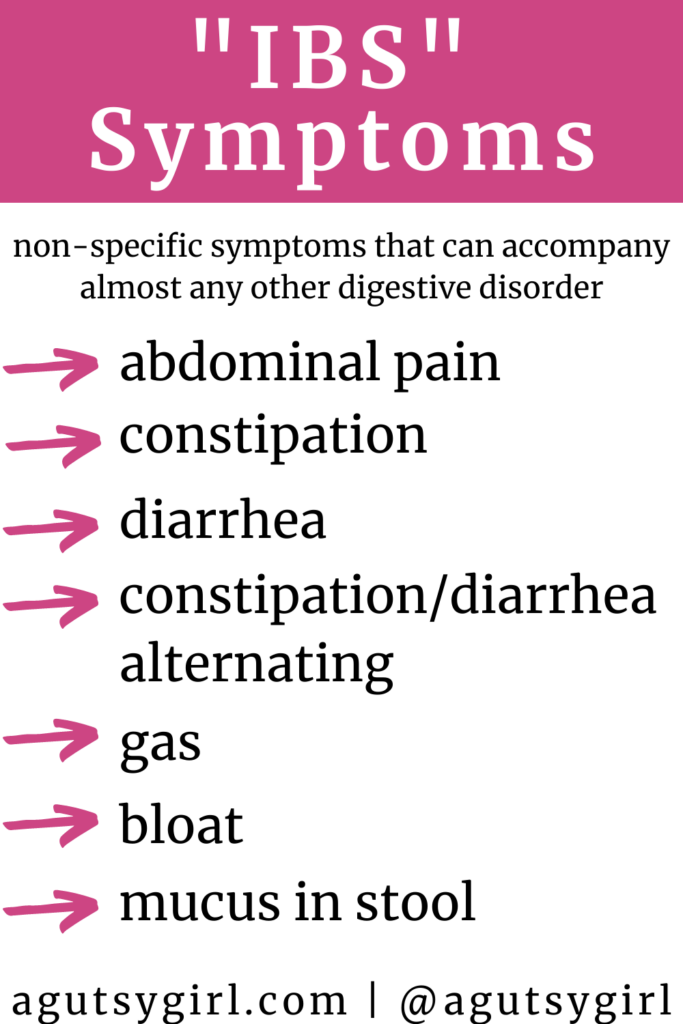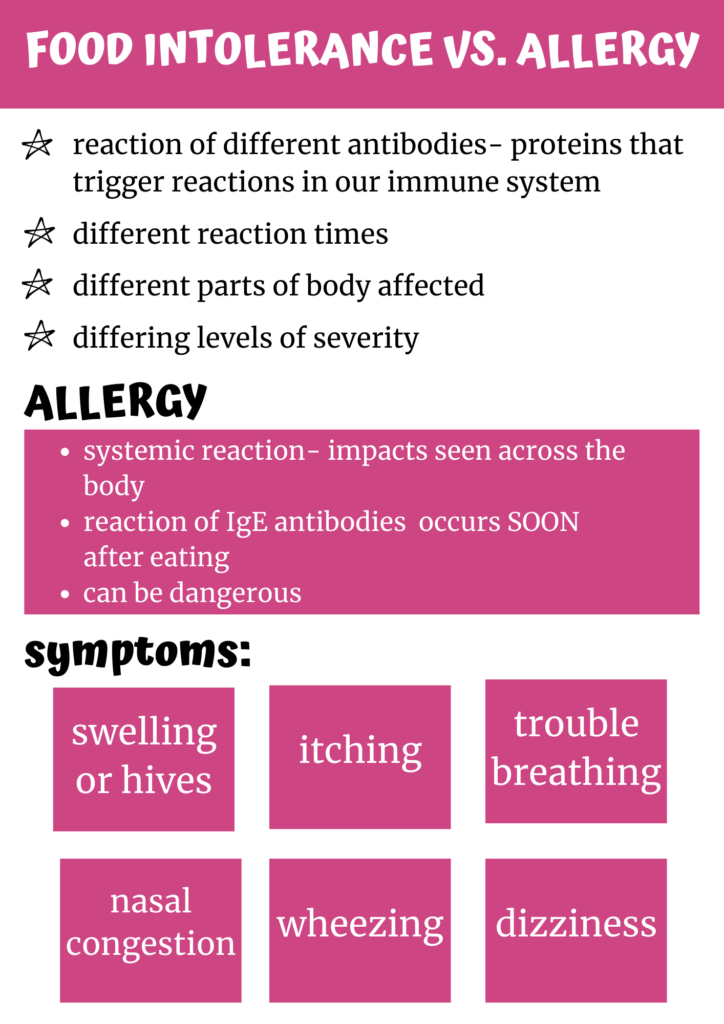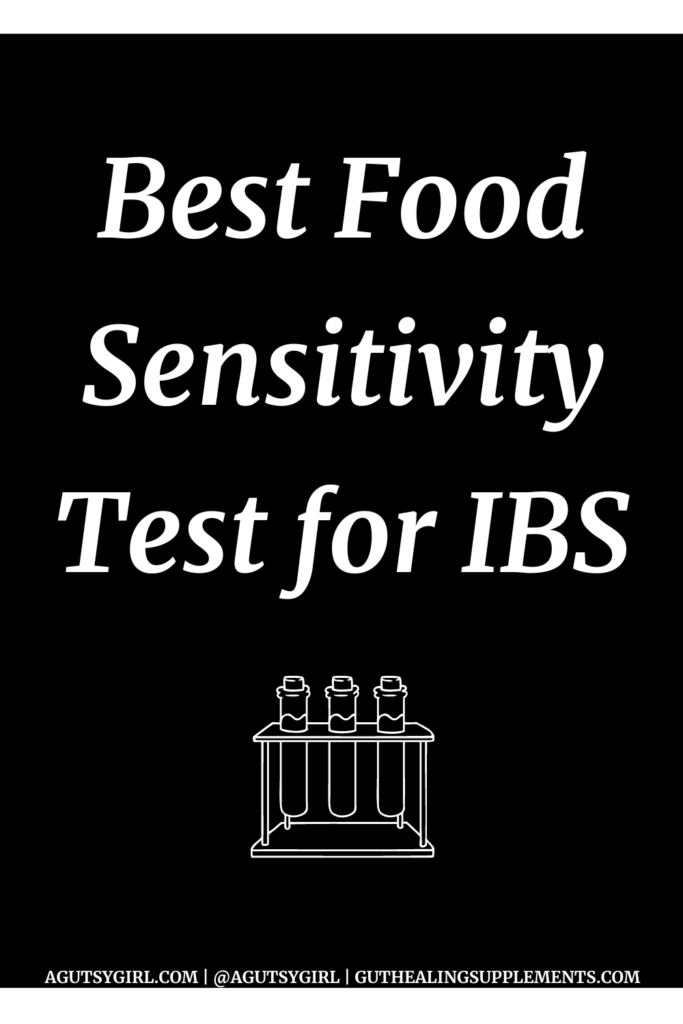Alright, let’s address it — what is the best food sensitivity test for IBS?
It’s a common question I get because everyone wants the easiest route to, “What specific foods can I safely eat and which foods are causing my digestive issues?”
So this is what I want to share, breaking it all down for you.
IBS
First, what is IBS?
IBS stands for Irritable Bowel Syndrome. It is classified as a syndrome, not a disease.
Irritable Bowel Syndrome is known as “spastic colon,” and since it’s a syndrome it’s just a set or range of symptoms that may fall into the defining category, Irritable Bowel Syndrome.
IBS, unlike IBD, does not cause tissue inflammation. In other words, if you were to be ‘scoped,’ doctors would not find tissue inflammation, scarring, etc. from IBS alone. (However, if you were scoped and did have a form of IBD, you would discover that. It would not be a pleasant finding, but critical.)
Even though there is no permanent damage done with IBS, it still can cause day-to-day pain, discomfort and misery for those who battle it. This is why I never say “it’s just IBS.” And that’s also why I always put “just” in quotation marks.
According to the International Foundation for Functional Gastrointestinal Disorders, IBS affects at least 10% to 20% of adults in the U.S. — mostly women — and is second only to the common cold as a cause of absenteeism from work. (source)
Finally, and this is something that people overlook all the time, but for which I’ve set out to help with.
IBS usually begins in late adolescence or early adult life — most often at times of emotional stress. Source

Symptoms of Irritable Bowel Syndrome
Everyone is different, namely because some have the IBS-C (constipation) version and others have the IBS-D (diarrhea) version while others have the alternating version which includes both constipation and diarrhea.
But in general, here are many common symptoms of IBS:
- abdominal pain
- constipation
- diarrhea
- both constipation and diarrhea, alternating
- gas
- bloating and/or distention (not the same things)
- mucus in stool
- nausea
Diagnosis of IBS
So, then, if IBS is a syndrome, not disease, then what is the diagnostic criteria? And how is IBS diagnosed?
According to the Rome IV criteria, the diagnosis of IBS requires the presence of the following criteria:
- Abdominal pain at least 4 days per month over at least 2 months associated with one or more of the following:
- Related to defecation
- A change in frequency of stool
- A change in form (appearance) of stool
- In children with abdominal pain and constipation, the pain does not resolve with resolution of the constipation (children in whom the pain resolves have functional constipation, not IBS)
- After appropriate evaluation, the symptoms cannot be fully explained by another medical condition
*Criteria fulfilled for at least 2 months prior to diagnosis
Note: There are different variations of time. Some say 2 months, others say 3 months, and yet even other sources say 6 months.
Regardless of an official IBS diagnosis or not, most acknowledge a problem food and/or problem foods in some capacity.
And this leads to the desire for understanding what those might be.
Food Allergy vs Food Intolerance

Remember, having an allergic reaction to foods is not the same as food hypersensitivity.
A food allergy is an “immune system reaction that occurs soon after eating a certain food. Even a tiny amount of the allergy-causing food can trigger signs and symptoms such as digestive problems, hives or swollen airways.”
It may or may not cause an anaphylactic reaction.
The most common food allergy signs and symptoms include:
- Tingling or itching in the mouth
- Hives, itching or eczema
- Swelling of the lips, face, tongue and throat or other parts of the body
- Wheezing, nasal congestion or trouble breathing
- Abdominal pain, diarrhea, nausea or vomiting
- Dizziness, lightheadedness or fainting
IGG food allergies often include immediate responses and symptoms to a food and are much more dangerous than food sensitivities.
It is important to get checked for food allergies if you are experiencing any of these symptoms.
Some of the top IgE food allergies include:
- dairy
- eggs
- fish
- shellfish
- soy
- wheat
- soybeans
Food Intolerance and Hypersensitivity
Yes, these two are basically the same thing.
“Food intolerance, also known as non-IgE mediated food hypersensitivity or non-allergic food hypersensitivity, refers to difficulty in digesting certain foods.”
A food intolerance and hypersensitivity will not trigger an allergic reaction.
However, it can cause a whole host of unpleasant symptoms such as abdominal pain, gas, bloating, headaches, and heartburn.
A food intolerance occurs when the digestive system fails to break down certain foods. It often can be due to a lack of pancreatic enzymes or certain developments over time, such as a lactose intolerance.
It also is often linked with increased iGg proteins, which can trigger an overactive immune response. This can cause inflammation and discomfort, especially in the gut region.
Food intolerances are extremely commonly, and it is where the majority of the Gutsy community falls.
And while it’s not life-threatening, it’s frustrating because a food intolerance has a delayed response.
It can take anywhere from hours to days to show up after eating specific foods.
Thus, people tend to spin their wheels for years trying to figure out what’s wrong. Some even go their entire lives without pinpointing which specific foods are giving them issues.
Best Food Sensitivity Test for IBS
Click HERE to save this best food sensitivity test for IBS for later.

So then, if you have symptoms of food sensitivity, what are the best food sensitivity tests to consider?
Here are 4 broad ways for food intolerance testing to consider:
Elimination Diet
This approach involves systematically eliminating potential trigger foods from your diet for a period of time and then reintroducing them to observe any symptoms. It is considered the gold standard for identifying food sensitivities and is often recommended as a first-line approach.
The ultimate goal of the elimination diet is to figure out any food triggers by way of removing foods and then later reintroducing them, one at a time. Simultaneously, you’ll watch for symptoms that show a reaction.
The process takes a slow-and-go approach.
Reactions could be eczema, general rashes and acne, bloating, diarrhea, joint pain, etc. Really, anytime your body is presenting signals that something is not right, the chances that it’s food related are fairly high.
IgG Antibody Testing
This type of blood test measures IgG antibodies produced in response to specific food antigens. The test aims to identify delayed food sensitivities.
However, the scientific validity and clinical utility of IgG testing for food sensitivities are still a topic of debate among experts.
Here are some reasons the IgG testing for food sensitivities are still debatable:
- IgG vs. IgE Response: IgG antibodies are part of the body’s immune response, but they are typically associated with long-term immunity rather than immediate allergic reactions. In contrast, IgE antibodies are involved in allergic responses and can trigger immediate symptoms like hives, difficulty breathing, or anaphylaxis. IgG testing focuses on IgG antibodies, which may not necessarily correlate with clinical symptoms or indicate a true food sensitivity or intolerance.
- False Positives and Overdiagnosis: IgG testing has been criticized for producing a high rate of false-positive results, suggesting sensitivities to multiple foods that may not be clinically relevant. This can lead to unnecessary dietary restrictions and potentially nutrient deficiencies. The concept of IgG-mediated food sensitivity is still controversial, and many experts believe that elimination diets based solely on IgG testing may not be effective or necessary.
- Individual Variability: People can have a presence of IgG antibodies to various foods without experiencing any symptoms. IgG levels can also fluctuate over time, making it challenging to interpret their significance accurately. Additionally, there is a lack of consensus on which specific levels of IgG antibodies are clinically meaningful or indicative of a food sensitivity.
ALCAT Test
The ALCAT (Antigen Leukocyte Cellular Antibody Test) measures cellular reactions to various food antigens. It identifies potential food intolerances by measuring changes in white blood cells in response to different foods.
But again, its effectiveness and clinical relevance have been questioned by some experts with similar concerns to the IgG Antibody Testing method.
Comprehensive Stool Analysis
This test assesses the gut microbiome, digestive function, and markers of inflammation. It can identify imbalances in the gut that may contribute to food sensitivities and IBS symptoms.
According to Doctor’s Data (I did a stool test through them),
The Comprehensive Stool Analysis (CSA) is an invaluable non-invasive diagnostic assessment that permits practitioners to objectively evaluate the status of beneficial and imbalanced commensal bacteria, pathogenic bacteria, yeast/fungus by culture, PCR, and other gold standard methods. Precise identification of pathogenic species and susceptibility testing greatly facilitates selection of the most appropriate pharmaceutical or natural treatment agents.
FoodMarble Device + App
There is another way that people are getting answers at home for discovering problematic foods.
This is via the FoodMarble device + app.
According to their website, the FoodMarble is, “The next era of digestive breath testing based on validated clinical technology.”
FoodMarble wants to help those suffering from chronic gut issues including IBS, IBD, chronic constipation, and SIBO/IMO.
They initially created a device to help people find the foods that best suit their unique digestion. This is achieved by tracking how their hydrogen levels change in response to the food they ate.
You can also get a FODMAP intolerance kit that can help you figure out your tolerance to some of the most common FODMAP sugars (lactose, fructose, inulin and sorbitol).
The device pairs with a handy app that records all your data so over time, you can see the trends.
FoodMarble didn’t stop there, more recently they added methane, which is vital for those who want to monitor SIBO/IMO, as well as constipation. The coolest thing about this device is, that you can test your response to your regular diet or even track how you are responding to any supplement you might be taking, as often as you need.
Each of us has a unique response to diet and supplements, so what works for one, might not work for the next.
Health Tests from Home
Regardless, did you ever think the day would come when you could do at-home tests for figuring out food sensitivities?
I did for sure, but I’m not sure it would look this robust.
You have frequently asked if I know of any place where you can get a food sensitivity test online. I’ve never really found great sources…..until now.
Here are some great places to get these tests online when symptoms of IBS are present and you’re looking for a starting place:
1. Everlywell
We make lab tests easy with 30+ at-home kits — from fertility to food sensitivity tests — ordered by you. Our tests offer simple sample collection, free shipping, and physician-reviewed results and insights sent to your device in just days.
Out of almost 1,700 reviews on their website, they have maintained an almost perfect 5-star rating.
And, in fact, the good news is that they have tests which extend far beyond the food sensitivity test.
General Wellness
- Food Sensitivity Comprehensive Test
- Heavy Metals Test
- Sleep and Stress Test
- HbA1c Test
- Omega-3 Basic Test
- Omega-3 Plus Test
Women’s Health
- Breast Milk DHA Test
- Women’s Health Test
- Ovarian Reserve Test
- Postmenopause Test
- Women’s Fertility Test
- Perimenopause Test
- Energy + Weight
- Thyroid Test
- Metabolism Test
- Vitamin D and Inflammation Test
- Vitamin D Test
Sexual Health
- STD Test – Male
- STD Test – Female
- Chlamydia and Gonorrhea Test
- Hepatitis C Test
- HIV Test
- Syphilis Test
- Trichomoniasis Test
Genomics Tests
- Food Sensitivity+
- Metabolism+
- DHA+
How to Do the EverlyWell Food Sensitivity Health Tests from Home
Test a broader set of foods that you suspect may be causing you discomfort with our most comprehensive food sensitivity offering. This test includes a wide range of foods and is ideal for people who eat a variety of cuisines.
Depending on the test you need, the collection method will vary. What stays consistent is that you’ll receive your results on the EverlyWell secure platform within just days of them receiving it.
Since I know many of you have been looking to do a Food Sensitivity Test, here is what the process for this one looks like:
- Once you order, the test materials are delivered to your doorstep.
- Enter the barcode included with your kit at EverlyWell.com.
- Complete a simple finger prick collection and return with prepaid shipping.
- An independent board-certified physician will review your results.
- Once verified, you’ll receive your results on our secure platform within just days.
Each food will be rated on a Class scale of 0-3: Class 0 (low reactivity) to Class 3 (high reactivity). This is a great place to start if you want to dig into your body’s relationship with food.
You will also get:
- Tailored suggestions about what to do next
- Help prioritizing your trial elimination diet
- Personalized information and education
You can grab any of the EverlyWell tests today and save 20% at checkout by using coupon code AGUTSYGIRL.
2. FoodMarble
FoodMarble is another at-home test that you can purchase online with or without a health care provider.
I have described this in far more detail above.
To purchase, simply go HERE, enter in code GUTSYG at checkout and you will save 15% + they will ship your products ASAP straight to your doorsteps.
3. Viome Gut Microbiome Test
Viome is a testing kit which aims to help you discover the precise food and supplements for your body in order to restore microbiome health.
This is both a stool and blood test.
Currently, there are three different testing options to choose from:
- Gut Intelligence™ Test
- Gut Microbiome Test (stool)
- Health Intelligence™ Test
- Gut + Cellular Test (stool + blood)
- Full Body Intelligence™ Test
- Gut Microbiome + Human Cells + Oral Microbiome (stool + blood + saliva)
I, in fact, have done the Health Intelligence Test, providing both a blood sample and stool sample.
From this test, as it relates to different types of food, here are my personal superfoods:
- anchovies
- artichoke
- broccoli
- egg yolk (chicken or duck)
- garlic
- green tea
- Jerusalem artichoke
- lamb
- raspberry
- salmon (wild-caught)
- sauerkraut
- sunflower seeds
I also received a breakdown of:
- overall gut health
- cellular and energy efficiency
- immune system health
- inflammation response
- biological age
Labcorp
Who hasn’t heard of Labcorp, right?
I am learning about them in a whole new way, though, and felt it necessary to share this option here as well.
While a majority of their tests are in-person collection vs. at home, they do still offer some at home plus the ability to purchase online.
Take for instance:
- Women’s Health Test
- Colorectal Cancer At-Home Test
- Fatigue Test
- Celiac Disease Antibody Test
- And yes, even a Food Allergy Test
Follow Up is Critical
Keep in mind that with all of the above, minus Labcorp, none of these are diagnostic tests.
Could they help you get to a diagnosis faster? Absolutely. But taking an at-home test in and of itself is never a full substitution for professional medical advice.
Rather than viewing them as a primary diagnostic tool, consider:
- Your ability to make dietary changes to help relieve symptoms
- Potentially reducing chronic inflammation
- Making a follow-up appointment with a healthcare provider for a full analysis of test results and steps to take for moving forward
- Working 1-on-1 with someone from the A Gutsy Girl health coaching team to navigate next steps
- Keeping a meticulous food journal alongside any of the options. If you need a tested, tried, and true gut-healing journey food and lifestyle journal, you’ll find it HERE.
What are YOUR thoughts? What have you tried? Are there any great ones out there I forgot about as a best food sensitivity test for IBS?
(EverlyWell Note: With the exception of our Sexual Health test panel, the tests we offer are not intended to diagnose or treat disease, or to substitute for a physician’s consultation. For regulatory reasons, our tests are not available in MD, NJ, NY, and RI.)
Disclosure: This post is not sponsored, but if you purchase, I make a minimal amount via affiliate income. This income helps keep my blog up, running, and thriving so I can produce all this content for you, for free. You can read more HERE.
If you liked this post on the best food sensitivity test for IBS, you might also enjoy:
- How to Reintroduce Foods After Food Elimination Diets
- Should I Do the Low FODMAP Diet
- IgE vs IgG Allergy
Xox,
SKH
🤰 bloating be gone! weight loss through optimal gut health for women
💃ʜᴇᴀʟ ʏᴏᴜʀ ɢᴜᴛ. ʜᴇᴀʟ ʏᴏᴜʀ ʟɪfe.
🫶🏻 founder gutbyome.com

![How Long Does Infused Olive Oil Last [+ DIY Herb-Infused Olive Oil]](https://agutsygirl.com/wp-content/uploads/2020/12/olive-oil-herb-featured-agutsygirl.com_.png)




![Gluten Free Lemon Chicken Recipe [Slow Cooker]](https://agutsygirl.com/wp-content/uploads/2022/12/drummies-featured.png)
4 Comments